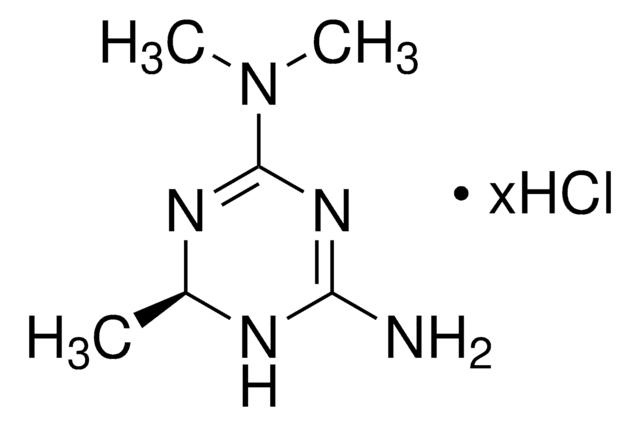SML3574
5-Ph-IAA
≥97% (HPLC)
Synonym(s):
2-(5-Phenyl-1H-indol-3-yl)acetic acid, 5-Phenyl-1H-indole-3-acetic acid, 5-Phenyl-indole-3-acetic acid
Sign Into View Organizational & Contract Pricing
All Photos(1)
About This Item
Empirical Formula (Hill Notation):
C16H13NO2
CAS Number:
Molecular Weight:
251.28
MDL number:
UNSPSC Code:
12352200
NACRES:
NA.21
Recommended Products
Quality Level
Assay
≥97% (HPLC)
form
powder
color
white to beige
solubility
DMSO: 2 mg/mL, clear
storage temp.
2-8°C
SMILES string
O=C(CC1=CNC2=CC=C(C3=CC=CC=C3)C=C21)O
Biochem/physiol Actions
5-Ph-IAA is a bumped auxin-inducible degron (AID) ligand that induces Skp1-Cul1-F-box (SCF) E3 ligase complex-mediated ubiquitinaton of Arabidopsis IAA17-derived mini-AID (mAID) degron-fused target proteins in cells expressing a hole-modified Oryza sativa TIR1 (OsTIR1) mutant (F74G or F74A). Unlike the traditional AID system, 5-Ph-IAA-based AID2 method shows no detectable leaky degradation, requires a 670-times lower ligand concentration, and achieves quicker degradation in cultures (0.2-5 μM) and in vivo (1-10 mg/kg via daily i.p. to mice xenografted with HCT116 CMV-OsTIR1(F74G) cells expressing mAID-tagged BRD4 or TOP2A).
Storage Class Code
11 - Combustible Solids
WGK
WGK 3
Flash Point(F)
Not applicable
Flash Point(C)
Not applicable
Certificates of Analysis (COA)
Search for Certificates of Analysis (COA) by entering the products Lot/Batch Number. Lot and Batch Numbers can be found on a product’s label following the words ‘Lot’ or ‘Batch’.
Already Own This Product?
Find documentation for the products that you have recently purchased in the Document Library.
An engineered, orthogonal auxin analog/AtTIR1(F79G) pairing improves both specificity and efficacy of the auxin degradation system in Caenorhabditis elegans
Genetics, 220(2), iyab174-iyab174 (2022)
SIN-Like Pathway Kinases Regulate the End of Mitosis in the Methylotrophic Yeast Ogataea polymorpha
Cells, 11(9), 1519-1519 (2022)
The enteric nervous system of the C. elegans pharynx is specified by the Sine oculis-like homeobox gene ceh-34
eLife, 11, e76003-e76003 (2022)
Aisha Yesbolatova et al.
Nature communications, 11(1), 5701-5701 (2020-11-13)
Protein knockdown using the auxin-inducible degron (AID) technology is useful to study protein function in living cells because it induces rapid depletion, which makes it possible to observe an immediate phenotype. However, the current AID system has two major drawbacks:
A super-sensitive auxin-inducible degron system with an engineered auxin-TIR1 pair
Nucleic Acids Research, 48(18), e108-e108 (2020)
Our team of scientists has experience in all areas of research including Life Science, Material Science, Chemical Synthesis, Chromatography, Analytical and many others.
Contact Technical Service







